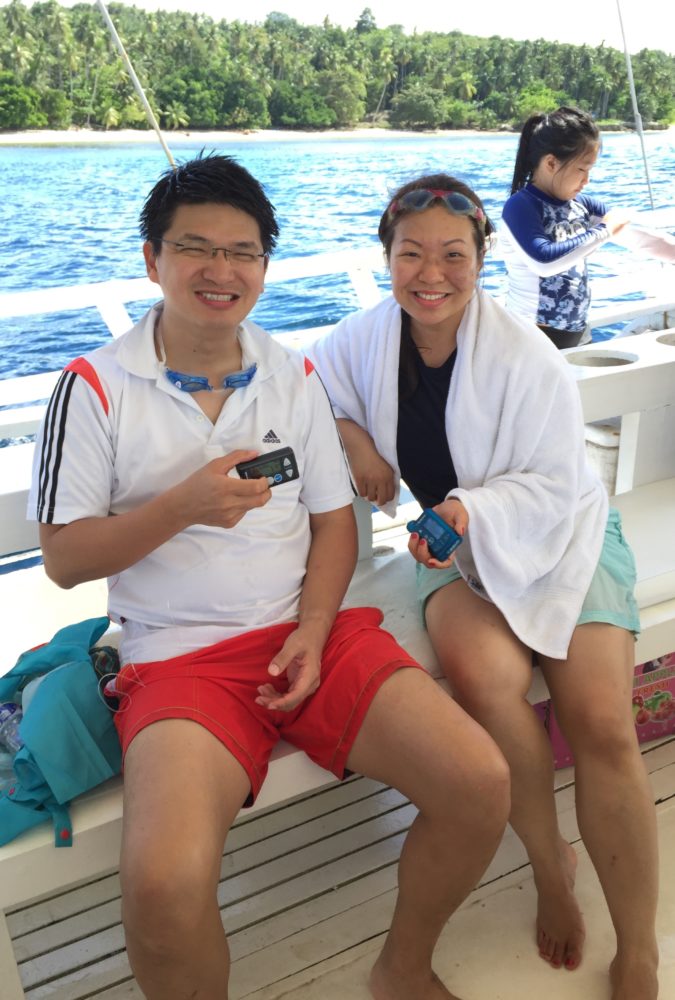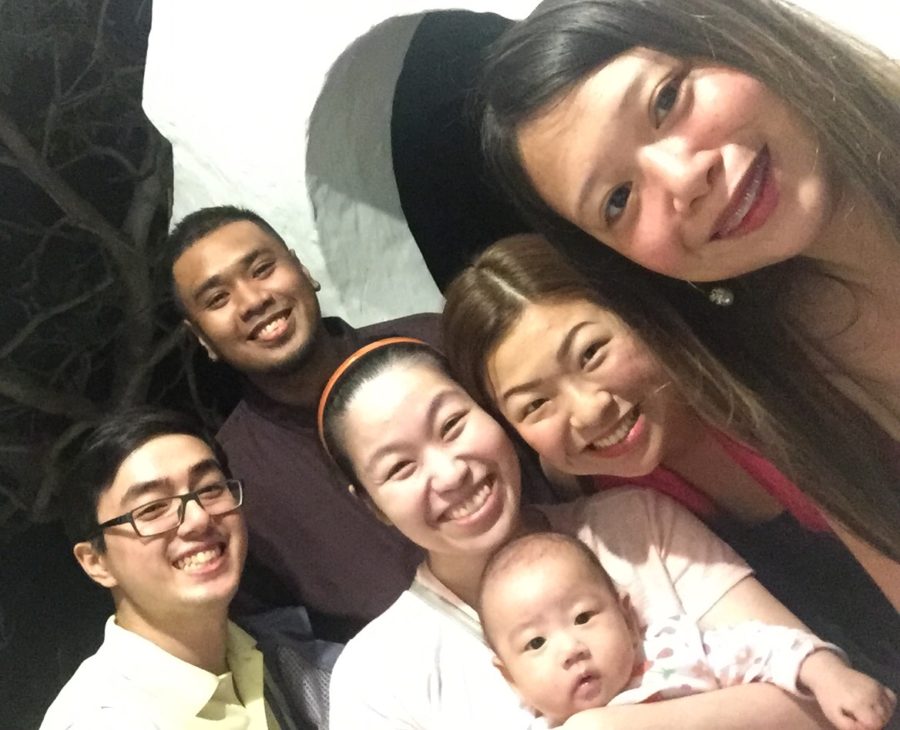What does the word “family” mean to you? To some, it brings comfort and joy, but to others, this word may bring fear or burden. Different people have different experiences altogether, because there is no such thing as one equation fits all. For me, I’m blessed that my family has always been my home ever since I was diagnosed with type 1 diabetes mellitus (T1DM) when I was thirteen years old.
In my 17 years of living with T1DM, my diabetes has always popped up in the family’s news headlines as if I was doing something wrong. It’s not that I was behaving badly; it was just that my family has been concerned about my health. I first felt irritated at what seemed like them being overly concerned about me, but over time, I realized that they just needed to hear my voice to better understand and support my situation. Ultimately, their concerns showed, and continue to demonstrate, how much they love me.
Over the years, I have gotten used to them saying:
“No, you can’t eat that. Did you sneak in the refrigerator?”
“Did you check your blood sugar?”
“Have you treated your hypoglycemia with glucose tablets?”
“Can you play sports? Aren’t you suffering from low blood sugar?”
“Ohhh shocks, Johanah’s not yet up, is she unconscious or hypo?”
“Why are you perspiring so hard? We’re inside an air-conditioned mall.”
“Wake up, wake up little sister.”
“What’s your HBAIC? Hope it’s lower this time.”
“Why did you get so irritated and angry? Are you having hyperglycemia?”
How do you think these questions make any diabetic feel? For me, it can be irritating at times, especially when my blood sugar is on a spike. On most days, though, I would feel a little bit upset, but after five minutes, I am able to process the situation and feel that I’m being cared for.

Different diabetics will react or respond differently. What’s important is for them to have their family around and feel that they are not alone in managing their chronic illness. My family has been supportive every step of the way, including my cousin Ian who’s also a type 1 diabetic.
Diabetes in a Nutshell
Diabetes has become rampant worldwide. Most diabetics fall under type 2, while some fall under type 1 and gestational diabetes. Type 1 diabetics are insulin-dependent for life. Type 1 diabetics like me cannot survive without insulin and test strips for a prolonged period of time. Treatment for type 1 diabetics includes taking insulin, frequent blood sugar monitoring, eating healthy food, exercising regularly, and food counting. On the other hand, most type 2 and gestational diabetics can handle oral medications, and their diabetes can become reversible if partnered with a healthy lifestyle. Some may also take injectable insulin to lower their blood sugar.
Challenges as a T1DM
Diabetes self-care is very critical in managing one’s diabetes. The challenges I have experienced in dealing with my T1DM include troubleshooting my blood sugar when I have irregular schedule of physical activities, losing weight, bullying when I was younger, having an eating disorder, maintaining good HBAIC (hemoglobin A1c) level, and managing my anxiety and depression when I have diabetes burnout. All of these must be managed well because diabetes can also have long-term implications for health and wellbeing. I get through these challenges with the support of my family, friends, and health care professionals.
I hope parents and diabetic supporters can know how much you all mean to your diabetic loved ones. For instance, I get hurt if people look down on my physical abilities or consider me a burden to them or less of a person because of my diabetes. I’m capable of physical activities, mental thinking, and emotional challenges just as any of you are. The only difference is, type 1 diabetics like me need to inject insulin and check our blood sugar more often than you do.
How to Support Diabetics
Your love and support will mean so much to us. Here are my suggestions as to how you can support any diabetic you meet—whether type 1, type 2, or gestational:
- Ask questions, like “How can I help you when you hit low or high blood sugar?” “How do you want me to support you when you are tempted to eat unhealthy food?” “You seem agitated. Would you like some water? or “How’s your blood sugar?”

- Be present. If we want to go for a walk or exercise, join us. That will be encouraging to us. Your presence is one comforting way you share our pain. Do support us in our activities with your presence and befriend our diabetic friends. When my dad and mom provided help to my diabetic friends, I felt their extended love towards them, and it was amazing! You could also drive us to our doctor’s appointments and listen to our doctor’s advice.

- Make suggestions, but do not control us. Don’t be quick to judge, criticize, or blame. When you see our very high or very low blood sugar reading, don’t be quick to judge. Rather, help us nicely by providing suggestions and support rather than raising your voice nor questioning us. “Do you need your insulin pen to lower your blood glucose? I can bring it to you.” Or “Do you need a can of soda to raise your blood sugar? I can get.” Or “Do you need a place to rest first? Can I drive for you?”
- Be tolerant. Use positive affirmation and reinforcement. Tolerance, in this case, means you being willing to adjust and adapt to our lifestyle. Understand that we also get tempted when we see everyone eating delicious ice cream, flavorful cakes, refreshing iced teas, and the like. It will help us if you can refrain from ordering these food. If not, then don’t control nor restrict us from not having them. Statements like, “Oh, you can’t eat that,” is rather negative compared to “You can have some, but just a little. Eat moderately.”
Also, avoid comparing us to those who don’t have diabetes. Complaining in front of us about our expenses, for instance, gives us undue stress because we don’t want to be a burden to the family.
- Learn how to check diabetics’ blood glucose reading and how to inject insulin. When faced with emergency situations, we really need your help. Please learn to check our blood sugar, especially when we fall unconscious. Subscribe to ambulance numbers like Lifeline to keep us from incurring expensive hospital expenses. Know our doctor’s contact details. If you can inject insulin for us when we’re having a higher blood glucose reading, that may also help.
- Don’t doubt; learn to trust. Be patient and positive. Whenever our loved ones don’t know our blood sugar, they tend to doubt and get anxious about whether we are on track with the right glucose readings. Yes, prolonged hyperglycemia or hypoglycemia can bring about complications, but we need your support to trust us in this process. Sometimes, it’s hard to quickly lower our HBAIC and blood sugar, but please be patient and positive that we are trying our best to achieve the optimal results for our blood glucose.

(Right photo) My fellow type 1 advocates from an advocacy talk by Novo Nordisk where we got to learn and share about our challenges and recommendations.
- Be open-minded; give us freedom. When we have activities or need to travel alone, please don’t restrict us. Be open-minded that we have prepared enough insulin, test strips, glucose tablets, etc. for our trip. Allow us to meet other type 1 diabetics and friends. Allow us to enjoy life and adventure once in a while.

- Give back, get involved. Diabetes is not a curse, but rather a gift that only a selected few have to help their fellow diabetics. It’s good if you can support us in giving back to other diabetics by sharing your stories and tips.

(Right photo) Gimik Diabetes is an annual gathering for types 1 and 2 diabetics. The 12th one was held last November 2018.
Other links:
Living with Type 1 Diabetes in the Philippines: https://beyondtype1.org/diabetes-philippines/
Project SEA (Support Group, Education and Awareness): https://worlddiabetesday.org/en/library/468-diabetes-voice-october-2017-women-and-diabetes.html
The Slightest Help Makes a Big Difference https://www.youtube.com/watch?v=dQ-8ya_N5AQ
Call for Universal Health Care: https://www.facebook.com/intdiabetesfed/videos/2253198844770414/ and https://www.facebook.com/intdiabetesfed/videos/332523384109538/
Triathlon Journey https://issuu.com/multisportph/docs/multisport_082013 (page 18-19) and https://www.swimbikerun.ph/2013/03/multisport-magazine-february-2013/
Introducing the Young Leaders in Diabetes (2018-19) https://diabetesvoice.org/en/advocating-for-diabetes/introducing-the-idf-young-leaders-in-diabetes-2018-19/

Johanah Co was diagnosed with Type 1 diabetes in 2001. She is a member of the IDF Young Leaders in Diabetes (YLD) program, representing the Philippines. She hopes to help provide emotional support to people with T1D and register them with Diabetes Philippines’s council on childhood diabetes. If you would like to create a Type 1 Workshop or support group, please contact Johanah at jco.managingdiabetes@gmail.com or message her on Instagram via jcolucoloco_t1d. For more information about Type 1 diabetes, you may join Act1ve Diabetes PH community run by Chesca Villanueva. You may also check out #T1DPH and #act1vediabetesPH.




